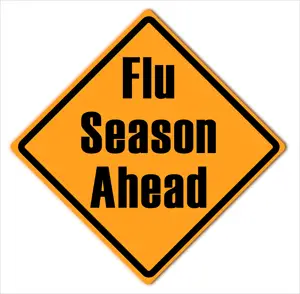 It’s that special time of year again when noses run, bodies ache, and fevers burn. Signs are everywhere declaring that the seasonal influenza has arrived. Although most people recover within a few days, older adults can be at risk for serious flu related complications. In fact, ninety percent of flu related deaths and more than half of flu related hospitalizations happen to people 65 and older.
It’s that special time of year again when noses run, bodies ache, and fevers burn. Signs are everywhere declaring that the seasonal influenza has arrived. Although most people recover within a few days, older adults can be at risk for serious flu related complications. In fact, ninety percent of flu related deaths and more than half of flu related hospitalizations happen to people 65 and older.
The seasonal influenza or “flu” is a contagious respiratory illness caused by viruses that affect the nose, throat, and lungs. Signs of the flu include: fever, chills, cough, runny nose, body ache, headaches, fatigue, diarrhea and vomiting.
Complications of the flu for older adults, pregnant women, and people with other medical conditions can include: bacterial pneumonia, ear infections, sinus infections, dehydration, and worsening of chronic medical conditions, such as congestive heart failure, asthma, or diabetes.
According to the CDC, the best way to prevent the flu is by getting vaccinated each year.
The best time to get an annual vaccination is in October, once the vaccine is available to the public. After vaccination, It takes approximately two weeks for antibodies to form to protect against the flu.
Find a flu vaccine close to you or your patient with this locator.
Medicare Part B normally covers one flu shot per season.
Once vaccinated, these additional steps can help older adults to stay healthy during flu season:
- Wash hands often with soap and water or alcohol based rub
- Avoid touching eyes, mouth, and nose
- Get plenty of sleep and exercise, manage stress, eat healthy food
- If sick with flu-like symptoms, stay home for 24 hours after fever is gone
The CDC provides specific information on who should do it, who should not, and who should take precautions. Talk to your medical provider about concerns and questions.
